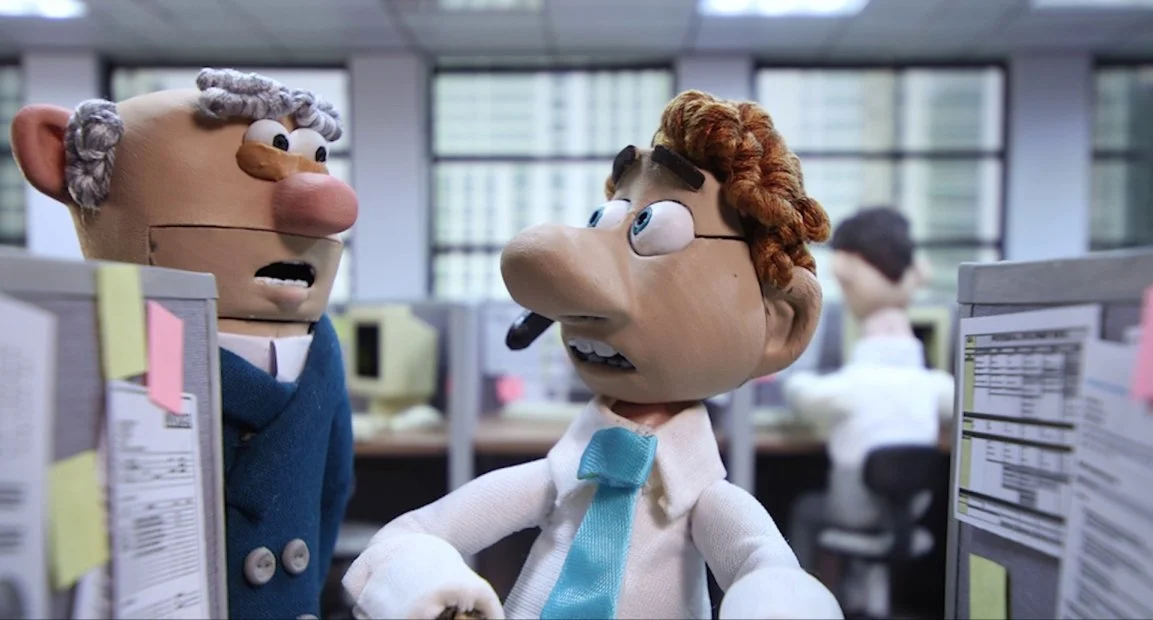
PMA Films Specialist Chris Gray dives into our upcoming screenings for FEBRUARY 17-26
Subscribe to our films email and keep up to date on screenings, trailers, news, and more!
Screening Times & Tickets:
2023 Oscar Nominated Shorts – Animation
One of our most popular annual programs, we begin our annual screenings of the Oscar nominated shorts this weekend with the very strong animated shorts package, which begins in high, wry style with Lachlan Pendragon’s funny and inventive An Ostrich Told Me the World Is Fake and I Think I Believe It. Think Being John Malkovich meets The Truman Show and you’re somewhere in the ballpark of this beautiful stop-motion gem. For my money, the peak of the program is the third film, João Gonzalez and Bruno Caetano’s The Ice Merchants, which takes a serene, surreal premise and executes it with a stunning mix of beauty and tension, masterfully meting out information and landing on an exquisite final image. Also of note is the one short in the program which is decidedly not suitable for children, Sara Gunnarsdóttir and Pamela Ribon’s My Year of Dicks, which chronicles a high school girl’s dynamic coming-of-age with an aptly eclectic, almost zine-like animation style and no shortage of trenchant wit.
Screening Times & Tickets:
2023 Oscar Nominated Shorts – Documentary
By far the longest of this year’s shorts programs, but perhaps its most edifying and eclectic, are the documentary shorts, which dwell on American politics, some very different animal caretakers, and emotional and intellectual evolutions over the course of 2.5+ hours. The program gets the tearjerkers (Jay Rosenblatt’s earnest and affecting How Do You Measure a Year? and Kartiki Gonsalves and Guneet Monga’s The Elephant Whisperers) out of the way first before pivoting to more sober fare. Joshua Seftel and Conall Jones’s is an emotionally risky work of longform journalism examining a would-be domestic terrorist. Haulout, directed by Evgenia Arbugaeva and Maxim Arbugaev and quite evidently the strongest film of the bunch, so masterfully conceals its subject matter for about five minutes that I’m loathe to spoil the surprise. Wrapping things up is Anne Alvergue and Beth Levison’s The Martha Mitchell Effect, an impressively edited, fully archival dive into the impact of the titular political wife on the Watergate scandal and beyond. (Listeners of the podcast Slow Burn may be familiar with Mitchell’s story, though this short offers a more capacious survey of its subject.)
Screening Times & Tickets:
NYICFF Kid Flicks: Celebrating Black Stories (Free Family Day screening)
As part of our Family Day programming on Saturday, February 25, we’re pleased to offer a free screening of the “Celebrating Black Stories” shorts program from the New York International Children’s Film Festival. In these seven films, Black stories take the spotlight to highlight films that share the joy, determination, resilience, and complexity of being Black and young. Explore a range of genres and styles in a program that spans the globe.
PAST SCREENINGS
The Rules of the Game
Released in a brand new 4k restoration, Jean Renoir’s masterful 1939 dramedy about French high society has long been considered one of the greatest of all films. Until it fell to #13 last year, The Rules of the Game placed in the top 10 of every decennial Sight & Sound critics’ poll from 1952 until 2012. The film’s history, however, is much more complicated. When it was made, Renoir’s film was the most expensive French production in history, and the film’s initial release was highly divisive. Right-wing audiences booed and even fought at early screenings, and an intense critical reception prompted Renoir to reduce the film’s running time from 113 to 85 minutes. Much of that excised original material was lost, only for most of it to be rediscovered in storage, and a close approximation of the original cut was constructed in 1956. This is where the reappraisal of Renoir’s only “flop” (which was released shortly after one of his other masterpieces, 1937’s Grand Illusion) truly began. A riveting portrait of French elites and their servants during a hunting weekend on the eve of World War II, The Rules of the Game is a cutting and sophisticated moral tale and a striking example of an early classical-era film with a curious, roving camera and intense deep-focus shots.
Bad Axe
At once sweeping and intimate, David Siev’s documentary Bad Axe (shortlisted for Best Documentary Feature at this year’s Academy Awards in a highly competitive year) follows a Michigan family through the first year of the pandemic and an outbreak of unity and division in the wake of the murder of George Floyd. For his first directorial feature, Siev turns the lens on his Asian American family, a large and tightly knit group who all pitch in to run the family restaurant. David’s father survived the “killing fields” of Cambodia, and this trauma has instilled a tremendous resilience in the family, which is tested by the multi-faceted constraints and tensions unleashed by the pandemic. The family and their restaurant prove to be a uniquely fruitful perspective through which to relive the many ruptures of 2020, allowing Siev to offer a bracing and at times messy (in a good way) perspective on social justice, personal security, and small business ownership. I’ve read a couple variations online of Michigander Bad Axe viewers calling the documentary “the most Michigan film ever made,” a commentary on the movie’s complicated politics, which don’t settle neatly into conventional boxes and contribute to the film’s overall richness.
Saint Omer
Saint Omer is a film whose main idea sounds rather academic, but it’s nested in a gripping courtroom drama. The debut fiction feature by the French filmmaker Alice Diop (whose documentary We (Nous) is another of the year’s better movies) is based on a trial Diop attended in 2016, in which a woman was tried for the murder of her own infant daughter. Diop’s stand-in here is Rama (Kayije Kagame) a successful writer and professor who has a difficult relationship with her mother, and by extension the idea of motherhood. She decides to attend the trial of Laurence Coly (Guslagie Malanda), who claims that her child’s death (which she admits to facilitating) was an act of sorcery, the result of a curse.
Diop pointedly focuses on the fundamental illogic of Laurence’s crime, and how it is irreconcilable with the necessity of logic and cause-and-effect in the deliberations of a courtroom. Saint Omer is an inquiry into the nature of both subjectivity and objectivity. Diop draws this dialectic out further by placing Rama in the audience of Laurence’s trial, where Rama observes Laurence, everyone observes and judges Laurence, and in one startling moment, Laurence regards Rama. The dissonance between how we understand ourselves and how we are understood is one of the great subjects of philosophy (it should be noted that Laurence is an aspiring philosophy student), but it’s rare for a film to be so exquisitely subtle about its central idea. Here, it’s conveyed in delicate blocking and judicious editing, the building blocks of cinema. Brilliantly conceived and profoundly affecting, Saint Omer challenges our notions of knowledge and fairness through the simple act of listening to and regarding others.
EO & Au Hasard Balthazar
Often, I’ll begin these blurbs with a recap of a prolific director’s career, but I must admit that I have not seen a single film by the octogenarian Polish director Jerzy Skolimowski, who has by all accounts led a pretty varied and successful career before striking unexpected late-career gold with his terrific new film, EO. Co-written with his wife, Eva Piawaskowska, Skolimowski’s film can be viewed as a 21st-century revision of Robert Bresson’s Au Hasard Balthazar, a monumental tale of a donkey’s passive experience of modernity. (You can watch both of these films here on Sunday, January 29!) Skolimowski has been coy about whether his film is an homage, a correction, or something else entirely; his intentions aside, it feels accurate to say that EO is more curious about its donkey protagonist than Bresson’s film, which emphasizes the animal’s lack of control.
As filmed by Michael Dymek, EO is an open-minded and even liberatory experience. The film sends its adorable gray donkey (played by six adorable gray donkeys) on an episodic and often painful experience that moseys from Poland to Italy and touches on various aspects of agrarian and modern life. (Among other things, the donkey endures a handful of owners and finds himself wrapped up with a group of soccer hooligans.) Though Eo the donkey is not personified in any way—I would not know how to characterize his personality—Skolimowski’s film insists that he is a being with motivations, thoughts, and feelings. These are expressed both in the animal’s doleful eyes but also in the film’s willfully expressionistic, almost psychedelic aesthetic, where the camera will suddenly circle a wind turbine or tint the whole screen red. If Eo effectively proves a guide for the viewer, ushering us through a series of alternately hilarious and heartbreaking short films, the weird and enrapturing aesthetic Skolimowski deploys makes the animal’s freedom our primary concern.
Exhibition on Screen: Hopper: An American Love Story
This new film, released to coincide with the Whitney Museum’s current exhibition “Edward Hopper’s New York,” takes a deep look into Hopper’s art, his life, and his relationships. From his early career as an illustrator; his wife giving up her own promising art career to be his manager; his critical and commercial acclaim; and in his own words – this film explores the enigmatic personality behind the brush…
Combined with expert interviews, diaries, and a startling visual reflection of American life, Hopper brings to life America’s arguably most influential artist.
Let It Be Morning (with Maine Jewish Film Festival)
In collaboration with the Maine Jewish Film Festival, we’re excited to present a special advance screening of the new film from Eran Kolirin, director of the widely acclaimed 2007 film The Band’s Visit. An ensemble dramedy centered around Sami (Alex Bakri), who was born in Palestine but works in Jerusalem, the film is an exploration of cultural and personal identity set in an Arab village that suddenly finds itself under military lockdown. Rich with symbolism, Let It Be Morning begins at a celebratory family wedding but evolves into a thorny consideration of deceit and sociopolitical capital, suggesting that the borders that divide us can be psychological as well as physical.
Broker
The Japanese director Hirokazu Kore-eda specializes in films about friendships and families develop when they’re impacted by circumstances that run afoul of societal norms. His most successful film, 2018’s Shoplifters, is a standout in a long career of effective and very consistent dramas in this mode. Broker, Kore-eda’s first film made in South Korea, is something of a companion piece to Shoplifters, a humanist study/detective story that evolved from the director’s study of South Korea’s “baby boxes,” places where people can anonymously leave young children. Starring Song Kang-ho (best known as the father in Parasite, and a Best Actor winner at last year’s Cannes Film Festival for this performance) as a deeply indebted laundromat owner who partners with a security guard (Gang Dong-won) to illicitly sell children left in baby boxes to wealthy families, Broker approaches fraught material from a wealth of perspectives with great curiosity and empathy. Equal parts crime caper, social drama, and gentle comedy, Kore-eda builds a warm and resonant story out of inherently challenging material.
The Eternal Daughter
After a steady career working in British television, the director Joanna Hogg first appeared on the critical radar with a trio of acclaimed but underseen films co-starring Tom Hiddleston made both before and after his breakout Marvel role. With considerable support from Martin Scorsese, Hogg belatedly but still rather quietly made herself known to American audiences with The Souvenir (2019) and last year’s The Souvenir Part II, perhaps the most unlikely cinematic universe this side of Richard Linklater’s Before films. Balancing themes of addiction, grief, and the impulse to create art, the Souvenir films — which star Honor Swinton Byrne and her mother, Tilda Swinton — are a ripe and endlessly surprising diptych, by turns icy, elliptical, funny, and tremendously tender. I highly recommend seeing one or both of them before checking out Hogg’s new film, The Eternal Daughter, which stands on its own as an emotionally rich British gothic tale but also functions as a phantom limb of the world of The Souvenir.
A Covid production with a limited cast set entirely at a creaky, yawning hotel, The Eternal Daughter finds Tilda Swinton again portraying the aging but endlessly sympathetic Rosalind, who lived in the hotel as a child. Swinton also takes on the role of Julie, Rosalind’s filmmaker daughter, the part that was played by Swinton’s own daughter in the Souvenir films. Though this meta wink enriches the film (Tilda does an incredible job of recreating her daughter’s gestures), The Eternal Daughter more than stands on its own as a deft genre exercise that yields a tremendously nuanced consideration of family and aging. Nodding to classics like Hitchcock’s Rebecca and Jack Clayton’s The Innocents (a masterful adaptation of Henry James’s The Turn of the Screw), Hogg sublimates her admiration for British cinema into Rosalind, who seems to represent a last gasp of kindly British formality and the country’s historical memory of World War II. Julie, forever indecisive and overworked, attempts to “direct” this vacation so that her mother will provide her with fodder for a future film project. This endeavor is thwarted by elements both supernatural and hilariously practical (Carly-Sophia Davies, as the hotel’s receptionist, gives hands-down the year’s funniest performance). The Eternal Daughter is sort of a ghost story, but its hauntings aren’t just phantasms or memories: they’re also mundane and devastating fears, like what if we don’t fully understand ourselves or our loved ones before they’re gone?
All the Beauty and the Bloodshed
One of the most acclaimed films of the year, the remarkable All the Beauty and the Bloodshed is a rigorous and hugely affecting chronicle of the life, art, and activism of the photographer Nan Goldin. Her slide show/artist book The Ballad of Sexual Dependency, a photograph from which is featured in our current exhibition “Presence,” is a crucial element of element of the documentary and perhaps the nexus of all its ideas about therapeutic expression, pain, and self-discovery.
Goldin is, perhaps needless to say, an esteemed photographer whose intimate and uncanny art stands as a lodestar of both the downtown NYC arts scene of the 1970s and 1980s and the subsequent AIDS crisis that ravaged the same community. Her work curating an exhibit of queer art during this time became red meat for the culture wars of the 1990s, one of many moments of the film that feel as though they’re reflecting our present experience. Director Laura Poitras, a cerebral and uncommonly gifted figure in the documentary world – she is best known for the Oscar-winning Citizenfour, about Edward Snowden, but I highly recommend her 2010 War on Terror film The Oath – shapes the film into a revealing and stealthily devastating dialogue about how Goldin’s experience in a troubled family informed both her work and the long struggle with opioid addiction that led to her activism against the Sackler family, whose name until recently was a fixture at major museum’s across the world. Patrick Radden Keefe, the New Yorker writer whose book Empire of Pain is an essential text for understanding both the Sacklers and the current addiction crisis, offers useful context throughout All the Beauty and the Bloodshed but the film broadly functions more like an almost unbearably intimate personal essay. It’s framed and structured with incredible care and delicacy, and it’s as forthright and quietly devastating a film as I’ve seen this year.
The Inspection
A raw and intimate boot camp drama, The Inspection is the striking feature debut by filmmaker Elegance Bratton. The film, an autobiographical portrait of Ellis (Jeremy Pope, in a performance just nominated for a Golden Globe), an unhoused gay man who enlists in the Marines to earn the respect of his homophobic mother (Gabrielle Union), has more than a little in common with Barry Jenkins’s landmark Moonlight. Bratton deftly evokes both the brutality and the unlikely tenderness of its setting, which has been explored in films as distinct as Full Metal Jacket and Beau Travail. Taking cues from both (the great Bokeem Woodbine plays a familiarly fearsome drill sergeant), The Inspection still blazes its own trail thanks to its fraught consideration of Ellis’s subjectivity in an environment where everyone is meant to behave as though they don’t have an identity. Why would Ellis want to subjugate himself in this way, and place himself in an environment where he must live a lie? Bratton approaches this question with a great deal of nuance and ambiguity, resulting in a film that resists tidy narratives but offers deep wells of empathy.







